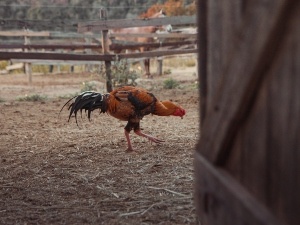
Roosters may sometimes seem as though they are walking strangely but these birds, when healthy, are very deliberate when it comes to their walking.
So, if your rooster keeps falling over you’ll know that there is something up, this article looks into why this happens
Table of Contents
Rooster keeps falling over:
A loss of balance is a major behavioral change in your rooster and major behavioral changes in your bird aren’t usually good. Here are reasons why your bird may be falling over:
Nutrient deficiency:
A lack of nutrients in your bird’s diet can affect its behavior and its appearance. There are a variety of nutrient deficiencies that can cause your rooster to start falling over.
A lack of vitamin B1, thiamine, selenium, and vitamin E can all cause your bird to start falling over
What to do:
If your bird is lacking in one vitamin or mineral then the bird is likely lacking in a variety of vitamins or minerals.
Thus, offering your bird chicken feed, which is usually supplemented with all the vitamins and minerals that your bird will need to thrive and survive, is recommended.
You can also add a supplement to your bird’s food and water supply. You may have to take your bird to the vet to be tested to figure out which vitamin or mineral the bird is lacking in
Selective feeding can also cause a nutrient deficiency in your bird. Selective feeding is when too many treats are available to the bird and the bird eats these instead of its regular feed resulting in a nutrient deficiency.
If your bird is selectively feeding then you’d need to limit how many treats you give the bird. Treats should only make up 10 percent of the bird’s diet, make sure that your bird is eating enough feed to maintain good health.
Botulism:
Botulism is a disease that birds get from either consuming dead flock mates, eating moldy, rotten, or spoiled food, decaying meat, decaying vegetables, or drinking slow-moving water.
All of these sources can contain a neurotoxin produced by a bacteria called Clostridium botulinum. This neurotoxin causes birds to lose control of their limbs and fall over.
What to do:
There is no specific treatment for botulism but some birds will recover on their own especially if the bird only ingested a small amount of this neurotoxin. Unfortunately, many infected birds will die of this disease.
Aspergillosis:
This is another disease that can cause your bird to fall over, aspergillosis is a fungal disease that can affect chickens, a variety of birds, and humans too.
Aspergillus spores are widely distributed in the environment. Birds contract this disease when they inhale large numbers of spores and become infected.
Healthy birds who inhale these spores will not be affected but birds whose immune systems are compromised can develop an infection when they inhale the spores.
Spores can come from contaminated feed, litter, dusty areas, bedding, air ducts, and equipment.
What to do:
Unfortunately, there is no cure for aspergillosis, the best way to keep your other birds safe is to remove any contaminated materials and remove the birds from the contaminated environment. This disease is not contagious.
Mareks:
Mareks disease is one of the more common chicken diseases, the symptoms of this disease can be quite serious and the effects can be devastating.
Mareks is a Herpes virus infection of chickens that can spread through chicken dander, it is highly contagious.
Some birds with Mareks will not show any signs of having this disease while others will show symptoms such as falling over (Mareks causes paralysis), irregular pupils, vision impairment, loss of appetite, loss of weight, dehydration, depression, and grey irises to name a few.
What to do:
Unfortunately, there is no cure for this disease and if a bird catches Mareks this disease will live in the bird for life. Some birds who catch Mareks will be asymptomatic so you may not know whether your bird actually has this disease or not.
The best way to keep your birds safe is to vaccinate birds early on in life.
Bumblefoot:
Bumblefoot is not a disease but rather a condition. Your bird’s feet aren’t as rough as one would think they’d be, rooster feet are sensitive and can injure quite easily.
If the skin on your bird’s foot becomes injured, and bacteria gets into the foot, the bird may develop a pus filed abscess covered by a green or black scab over it, this is called bumblefoot.
Walking on this foot can be quite painful to your bird and this can sometimes cause it to fall over
What to do:
You can either take the bird to the vet to have the scab and abscess removed, or, you may choose to treat the bird at home.
This is how to treat the bird at home:
Start off by soaking the bird’s foot in a solution of warm water and Epsom Salts. After this, scrub the foot to soften the foot tissue and then remove the scab. Once the scab is removed carefully squeeze out the pus from the bird’s foot.
Dry the wound afterward and then use Chlorhexidine 2% wound care spray or vetericyn plus poultry care spray to kill any remaining bacteria on the bird’s foot.
Once the wound is clean, dress the foot. You may need to spray the wound and then redress it on a daily basis
If you enjoyed this article then you may also be interested in other chicken related articles. Here are some articles that you may be interested in: Chicken Sounds Hoarse, Sick Chicken Not Eating Or Drinking, Chicken Acting Like Something Stuck In Its Throat, Chicken Acting Disoriented, Runt Chick Not Growing,


